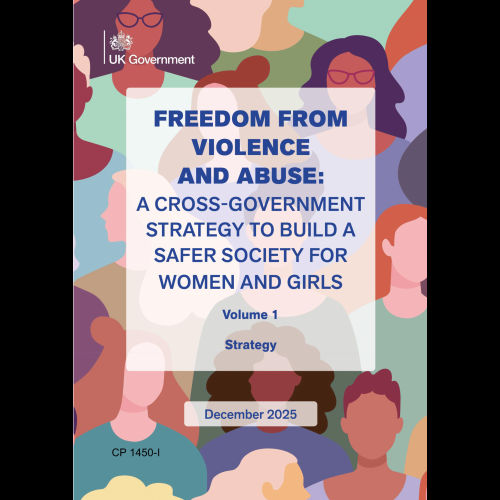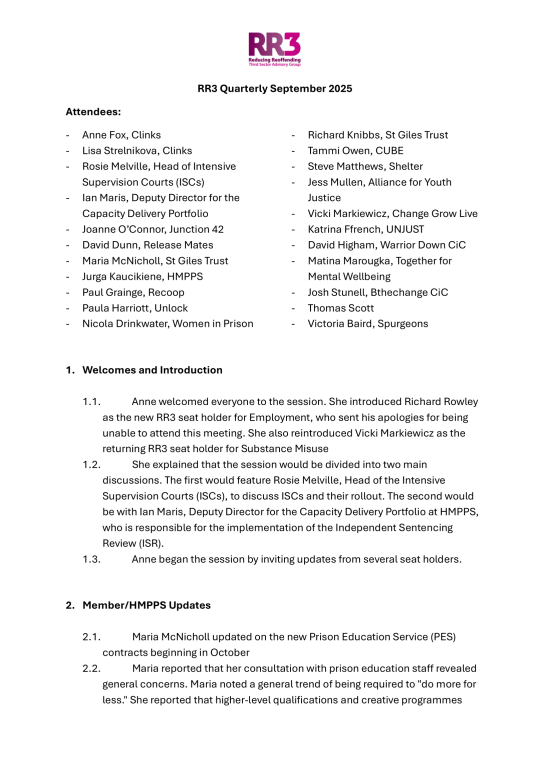At the start of going into lockdown Clinks surveyed the voluntary sector working in criminal justice on how they had been impacted by Covid-19 and the restrictions put in place to manage its spread.
Now that more than three months has passed since the initial lockdown was announced the situation has developed, guidance has changed, and attention is increasingly turning to easing restrictions and remobilising society.
So we wanted to see, with the landscape changing so rapidly, how the sector was still faring and track the impact these changes were having on organisations. We surveyed the sector again, continuing to explore issues around service delivery, volunteer availability, the financial implications of the pandemic, and the impact on the people the sector supports. We had 98 responses and this blog will outline what we found.
Keeping up with demand
Our survey results showed that demand for the voluntary sector’s services has increased, with 53% saying this was the case. It is perhaps not surprising given the reduced availability of statutory services and lack of support that people in the criminal justice system will be receiving, that those services are turning to the voluntary sector to fill the gap.
However, responding to the demand in this environment has been challenging. Our previous round of surveys highlighted how hard voluntary organisations were working to adapt their services to the restrictions in place and where possible delivery remotely. However, despite the flexibly and resilience shown by the voluntary sector, there was still an overall decrease in service provision and this continues to be the case, with 45% of organisations who responded to this survey saying that their service provision has decreased slightly or a lot.
Not all services can be adapted for remote delivery and this method of delivery can also create barriers for engaging new clients in services and building relationships with them. 46% say the number of people they have been able to engage has decreased, with 31% of those saying it has decreased a lot. The loss of services also puts added pressure on those that continue to operate to support as many people as possible who now have less sources of support to turn to. Added to this are capacity issues, in particularly we continue to find a decrease in volunteer numbers. 48% say that the number of volunteers that support their organisation has decreased slightly or a lot, with feedback highlighting that for some organisations this has increased pressure for staff workloads and/or reduced what services they can provide.
“We have had to use paid workers and intensify recruitment to meet the demand.”
– survey respondent
“We have been unable to provide support services to the community as we would have liked.”
– survey respondent
The human impact
There is clearly great concern amongst the sector about the impact of Covid-19 and lockdown on people in the criminal justice system. The vast majority of respondents (95%) agree or strongly agree that the needs of the people they work to support have become greater during the Covid-19 pandemic.
A great area of concern is mental health and the impact lockdown and isolation is having, particularly for those who have experienced trauma and/or have pre-existing mental ill-health. This is particularly acute for those in prison who have been locked in their cells for 23 hours a day with limited social interaction and without access to support services, family visits or purposeful activities.
“We are increasingly concerned by the prolonged period of effective solitary confinement being experienced by those serving sentences … The damage to mental health will be enormous.”
– survey respondent
This is exacerbated by concerns that, in these restrictive conditions, organisations cannot support people through as they would like. 51% feel that the quality of support they can provide has decreased slightly or a lot during the pandemic.
Organisations also highlighted the challenges of not being able to meet with people in prison prior to their release to support them to prepare for the transition, and raised concern that people are being released without their basic needs being met, which is compounded by being unable to access key services once in the community.
“The needs have been much higher for those released from prison without planned in the community support and little direct access to services available in the community.”
– survey respondent
The responses highlight how the pandemic is exacerbating poverty and accommodation issues for people in contact with the criminal justice system. Organisations raised the challenges of accessing accommodation for prison leavers who are continuing to be released homeless despite government intentions during the crisis to ensure emergency accommodation for people sleeping rough.
"The needs of the clients we have continued to support have increased, significantly in some cases … e.g. homeless / temporary housing has been very difficult to address due to lack of available options, despite Government measures to assist with this.” – survey respondent
“We have also had to provide more food parcels than previously and deliver them as part of a crisis intervention” – survey respondent
Remobilising in-person services
At a national government level, the focus is increasingly turning to remobilising society and returning to a ‘new normal’. We found that a number of organisations (45%) in the voluntary sector are planning to return to face-to-face services within the next month. However, there is still a lot of uncertainty amongst organisations about the decision to do this, with 19% telling us they are not sure whether they will start face-to-face services in the next month and 23% saying they will not be.
The hesitancy is understandable. There are a lot of safeguarding issues and practical barriers to consider before beginning to reintroduce in-person services. The inconsistent approach across different sectors, agencies and areas creates added barriers for organisations to navigate the process of remobilising in-person services. It won’t be possible for a large portion of the voluntary sector who work in prisons to return to delivery as soon, as many remain heavily restricted. This is reinforced by the findings with only nine organisations telling us they plan to start delivering services inside prison within the next month.
Though through our engagement with voluntary sector organisations we understand there has been an inconsistent approach taken across the prison estate with some organisations in prisons being asked to restart services. This inconsistency and lack of transparency can make it hard for organisations to know what to do in this situation and we are advocating for organisations to have the information and support they need from prisons and central government to feel they can safely return.
Accessing the financial support needed to respond to these challenges
We found relatively low numbers of applications for the emergency grant funding made available from the government. We believe in part this represents concern amongst the criminal justice voluntary sector about the likelihood of being successful. Historically the sector does not have a strong relationship with the National Lottery Community Fund - who are responsible for distributing the Coronavirus Community Support Fund - due to its policy not to fund activity considered adjacent to statutory services.
For the Covid-19 Response Grants distributed by Clinks, the requirement for organisations to have a pre-existing relationship with HMPPS will have excluded many, particularly small, community-led specialist organisations, whilst simultaneously the requirement for an annual income of less than £500k will have excluded bigger organisations. This reinforces the need for a fund aimed specifically at the criminal justice voluntary sector that also recognises and enable applications from the diversity of organisations working in our sector and we continue to advocate for this.
What next?
We will be providing a briefing of the survey findings to senior officials at the Ministry of Justice – which you can read here - and using the findings to inform our influencing work with officials, government select committees and funders. We will also use it to inform the support we provide the sector to help organisations navigate this challenging time.
As the situation is rapidly changing, we want to continue tracking how the criminal justice voluntary sector is faring, especially as prisons and probation services begin to ease lockdown in different ways and at different paces. So we will launch another survey in a month’s time. I want to thank every organisation that has engaged so far in our surveys. We appreciate you taking the time to do this during this challenging period and would be grateful if you continue to do so. Your responses will support the evidence base about the impact of Covid-19 on this unique sector and help us to advocate for measures that will ensure your recovery and sustainability.
If you have any questions about the survey’s findings, please contact Lauren Nickolls, Policy Officer, at lauren.nickolls@clinks.org.
Photo: © Andrew Aitchison
What's new
Blogs
Violence Against Women and Girls (VAWG) Strategy Blog
Publications
Latest on X
The role is for a leader from an organisation focused on racially minoritised people, with expertise in service delivery, policy, advocacy, or related areas in criminal justice. Racial disparities are present at every CJS stage. This role ensures these voices are central in shaping policy to help address and eradicate them. Apply by Mon 18 Nov, 10am. More info: https://www.clinks.org/voluntary-community-sector/vacancies/15566 #CriminalJustice #RR3 #RacialEquity

